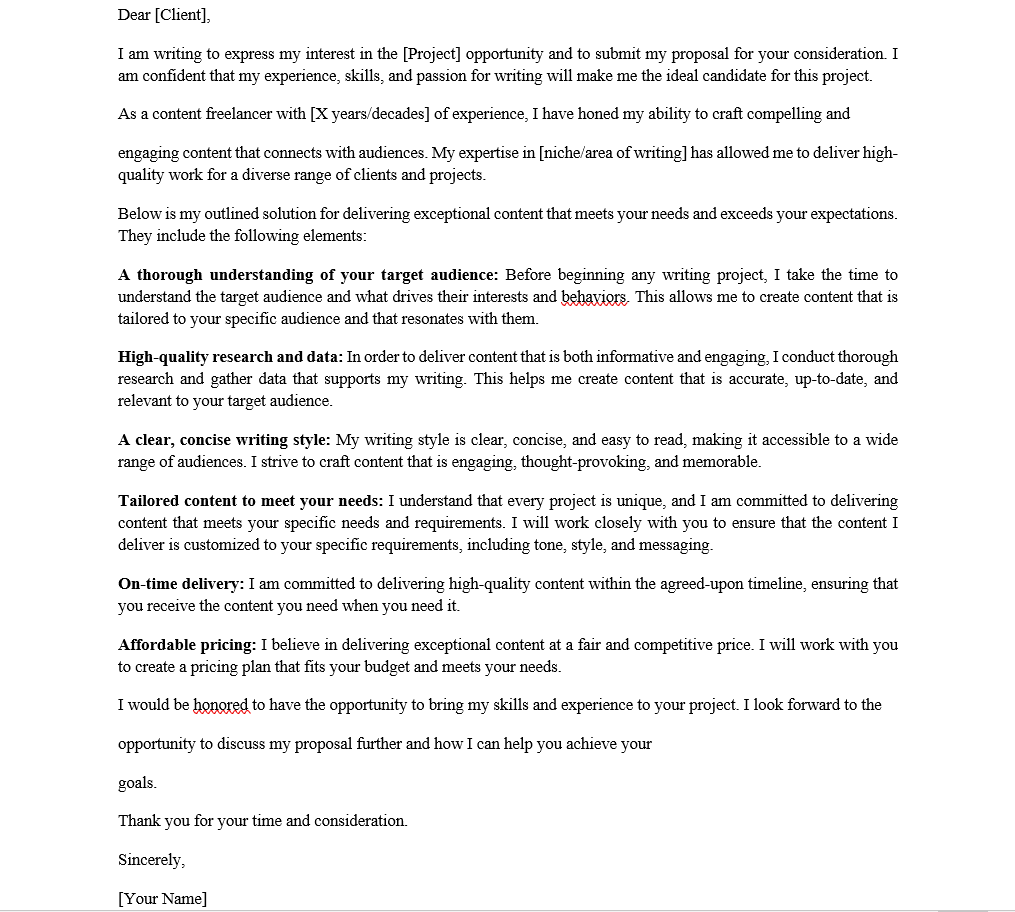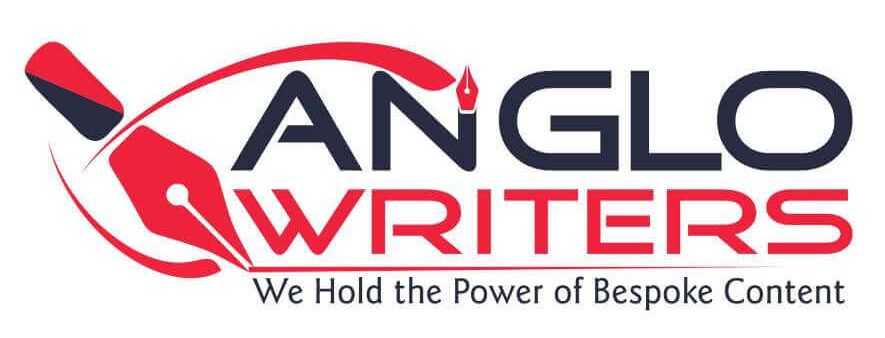As a content freelancer, you’re only as good as your last proposal. One shot to make a lasting impression, one opportunity to show your worth. But with so many competitors vying for attention, how do you set yourself apart and write a winning proposal? Writing a winning proposal as a content freelancer can make or break your future success. After all, the proposal you send to potential clients will be their first impression of you and your work. Without a strong proposal, they may never even consider taking a chance on you.
In this article, we’ll delve into the art of crafting proposals that captivate, convince, and close the deal. From weaving your personal narrative to highlighting your unique expertise, you’ll discover how to create a proposal that’s not just a list of facts, but a dramatic and memorable showcase of your talent. I will also share two sample content writing proposal that you can replicate for your next opportunity. So, hold onto your keyboard and get ready to write a proposal that truly shines!”
What is a winning proposal?
A winning proposal is a letter that lands a freelance writer the job they’ve been longing for. It needs to be clear, concise, and to the point, and it should highlight the writer’s unique skills and qualifications. It should also be tailored to the specific needs of the client. We will explain more on these later in this article.
In order to land content gigs, you’ll need to know how to write a winning proposal. A proposal to a content writer is a written letter that outlines the scope of a writing project and the terms under which it will be delivered. It is typically used to secure a content writing job.
As a content freelancer, your proposals will be aimed at convincing potential clients to hire you for their writing project. This means that your proposal must be well-written, clear, and persuasive.
Read our article: A Freelance Writer’s Guide: Six Simple Steps to Become a Professional Freelance Writer
Tips for writing a winning proposal as a content freelancer
1. Start by doing your research:
Learn about the client’s business, their target audience, and what they’re looking for in a content freelancer. This will help you tailor your proposal to their specific needs.
2. Keep it short and sweet:
No one wants to read a lengthy proposal – get straight to the point and make your case in as few words as possible.
3. Be clear and concise:
Use simple language that can be understood by everyone, and avoid jargon or technical terms wherever possible.
4. Make it personal:
A generic, one-size-fits-all proposal will likely end up in the trash. Take the time to tailor your proposal specifically to each client’s needs.
5. Be professional:
This may seem like a no-brainer, but it’s important to remember that first impressions count when you’re trying to land a gig. Make sure your proposal is free of typos and grammatical errors, and that it’s presented in a polished, professional manner.
6. Make sure your pricing is competitive:
Do some market research to see what other content freelancers are charging for similar projects, and make sure your prices are in line with these rates. Remember – you want to land the gig, so don’t price yourself out of the market!
7. Offer additional services:
Value-added services will set you apart from other content freelancers. This will show that you’re not just a one-trick pony, and will make you more attractive to potential clients.
8. Be prepared for Questions:
Should the client wish to consider you for the project, you need be prepared to answer any questions the client may have. Make sure you have all the information they need to make a decision, and be prepared to answer any questions they may have about the project.
Read our article: Top 5 channels for freelancers to setup online meeting with clients
9. Follow up after sending the winning proposal:
Make sure to follow up with the client after the proposal has been submitted, to make sure they’re happy with the finished product and to answer any questions they may have.
Putting these tips to use will help you write a winning proposal as a content freelancer. As long as you keep the essential elements in mind, your proposals will be sure to win over clients. Thanks for reading!
Elements that make up a successful winning proposal
Understanding the client’s needs and goals:
One of the most important elements of a successful proposal is understanding the client’s needs and goals. This requires research into the client’s industry, target audience, and current challenges. By taking the time to understand the client’s perspective, you can tailor your proposal to meet their specific requirements and present a solution that addresses their pain points. Additionally, demonstrating your understanding of the client’s goals and objectives can help build trust and credibility, and show that you are intested in the success of their project.
For example, if you’re pitching a blog post idea to a company in the fashion industry, make sure to reference recent trends in the industry, or discuss how your proposed post will help the company stay ahead of the curve. If you’re proposing social media content for a B2B company, focus on how you can help them generate leads and build relationships with potential customers.
No matter what type of content you’re proposing, always keep your client’s business goals in mind and show them that you understand what they’re trying to achieve. With a little research and some thoughtful tailoring, you’ll be able to write proposals that are far more likely to win over clients – and get you more work as a result.
Outlining a comprehensive and feasible solution:
Outlining a comprehensive and feasible solution is critical to the success of your proposal. This involves clearly defining the problem and presenting a solution that addresses the client’s needs and challenges. Your solution should be well thought out, practical, and feasible within the specified timeline and budget. Additionally, it’s important to emphasize the benefits of your solution to the client and demonstrate how it will help them achieve their goals. By presenting a well-crafted solution, you can show the client that you have the expertise and experience to deliver the results they need.
Demonstrating your qualifications and relevant experience:
In proposal writing, it is an important skill to demonstrate your qualifications and relevant experience is crucial in building trust and credibility with the client. This involves highlighting your skills, education, and past experience that are relevant to the project. Providing case studies and testimonials from past clients can also help demonstrate your abilities and reinforce your credibility. By effectively showcasing your qualifications, you can increase the client’s confidence in your ability to deliver the results they need.
Making a persuasive argument:
Making a persuasive argument is an essential part of a winning proposal. This involves highlighting the benefits of your solution to the client and making a compelling case for why they should choose you. Your argument should be supported by data, research, and real-life examples that demonstrate the effectiveness of your solution. By presenting a strong, well-reasoned argument, you can differentiate yourself from the competition and increase the chances of winning the project. Additionally, incorporating a call-to-action into your proposal can encourage the client to take action and choose you for the job. A persuasive argument can help you win over the client and convince them that you are the right choice for the project.
Tailoring the winning proposal to the specific requirements of the client:
Tailoring the winning proposal to the specific requirements of the client is a critical component of a successful proposal. This involves customizing the proposal to meet the unique needs and requirements of the client and their project. This can include addressing specific challenges, outlining a solution that meets their budget and timeline, and incorporating their branding and style preferences. By tailoring the proposal to the client’s specific needs, you can show that you understand their requirements and are committed to delivering a solution that meets their needs. Additionally, a tailored proposal can increase the chances of winning the project, as it demonstrates that you have taken the time to understand the client’s needs and are interested in delivering a successful outcome.
Pricing:
It’s also important to consider the client’s budget when pricing your services. If you know the client has a limited budget, you may want to adjust your rates accordingly. Be sure to get an idea of the budget before proposing a price so that you don’t end up overcharging or undercharging.
Read our article: Freelance Writer Rate: How to Boost Your Freelance Writing Income in 2023
Paying attention to the details:
Paying attention to the details is an important aspect of writing a winning proposal. This involves ensuring that the proposal is well-organized, easy to read, and free of errors. A clean, professional-looking proposal can help build trust and credibility with the client. Additionally, paying attention to the details in the proposal, such as font style, margins, and spacing, can help ensure that your proposal looks professional and polished. By paying attention to the details, you can demonstrate your attention to detail and your commitment to delivering high-quality work. This can help increase the chances of winning the project and make a positive impression on the client.
Being flexible and responsive:
Being flexible and responsive is an important aspect of writing a winning proposal. This involves being open to feedback and willing to make changes to the proposal based on the client’s needs and requirements. Being flexible and responsive can help build trust and credibility with the client, as it shows that you are committed to delivering a solution that meets their needs. Additionally, being flexible and responsive can help increase the chances of winning the project, as it demonstrates that you are a partner who is committed to finding the best solution for the client.
When reviewing these examples, pay attention to the following elements:
The problem being addressed in the winning proposals and how the freelancer plans to solve it
- The problem being addressed and how the freelancer plans to solve it
- The proposed solution and why it’s the best option
- The value the client will receive from working with this freelancer
- The call to action that gets the client to hire them
Conclusion
As a content freelancer, writing a winning proposal requires careful thought and preparation on your part. You need to clearly state the scope of work you are offering and make sure that it meets your client’s needs and expectations. By ensuring that you provide solid details in the form of an accurate timeline, cost estimates and deliverables, as well as making sure that everything is properly formatted, you can ensure that your clients will be impressed with
Examples of winning proposals
Below are two samples of a writing proposal
Sample 1

Writing Proposal Sample 2
Author
-

Agunlejika Adeoluwa is a copywriter focusing on tech, SaaS, and scalable businesses. He assists companies with websites and blogs to gain visibility online through well-planned content strategies. You can follow him on LinkedIn.

